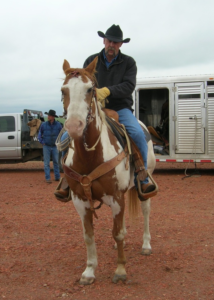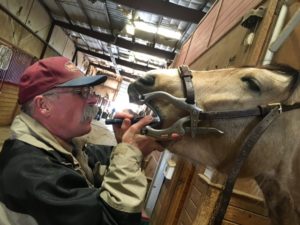 Keeping your horse sound: Performance evaluation is the most important service we can offer to our clients. One of the most common causes of poor performance is lameness. Dr. Connally has many years of experience evaluating and treating lameness. Lameness needs to be evaluated first by careful observation and examination. This may be done in hand or under saddle. To help localize the area of concern we use hoof testers, nerve blocks, and flexion tests. High tech tools such as digital radiography and ultrasonography have become so portable that we can bring them right to your barn to make specific diagnoses.
Keeping your horse sound: Performance evaluation is the most important service we can offer to our clients. One of the most common causes of poor performance is lameness. Dr. Connally has many years of experience evaluating and treating lameness. Lameness needs to be evaluated first by careful observation and examination. This may be done in hand or under saddle. To help localize the area of concern we use hoof testers, nerve blocks, and flexion tests. High tech tools such as digital radiography and ultrasonography have become so portable that we can bring them right to your barn to make specific diagnoses.
Dental abnormalities are another common source of performance limitation. We perform complete oral examinations looking for issues which may result in pain with the bridle or interfere with eating. Dental floating, reduction of excessively tall teeth, and extractions can be performed as needed. Sometimes a diet or feeding management change is all that is required to improve your horse’s oral health. We continue to believe that some equine dentists are not doing a service for the horse by excessive dental manipulations.
In addition to the best medications for your horse we offer acupuncture treatment and specific recommendations for physical therapies.
Dr. Connally has a particular interest in the foot. His experience as a farrier makes him exceptionally qualified to evaluate the hoof care of your horse. Proper trimming and/or shoeing the equine foot is critical for good movement, regardless of athletic endeavor.
 Keeping your horse healthy: Preventing disease is much more efficient than treating after it occurs. Vaccination and parasite control programs should be tailored for the individual horse taking into account their age, use, and environment. Nutritional management is critical for our horse’s health. Proper nutrition can decrease the risk of colic, increase longevity, and increase performance. We offer practical nutritional counseling including recommendations for logical supplement usage.
Keeping your horse healthy: Preventing disease is much more efficient than treating after it occurs. Vaccination and parasite control programs should be tailored for the individual horse taking into account their age, use, and environment. Nutritional management is critical for our horse’s health. Proper nutrition can decrease the risk of colic, increase longevity, and increase performance. We offer practical nutritional counseling including recommendations for logical supplement usage.
The geriatric horse often requires different medical and nutritional management than the younger horse. Management of chronic conditions such as Cushing’s disease, metabolic syndrome, or lameness is critical to maintaining function and comfort for the older horse.
Emergency care: We hope you don’t need it but we make every attempt to be available if your horse sustains an injury, or develops colic.
